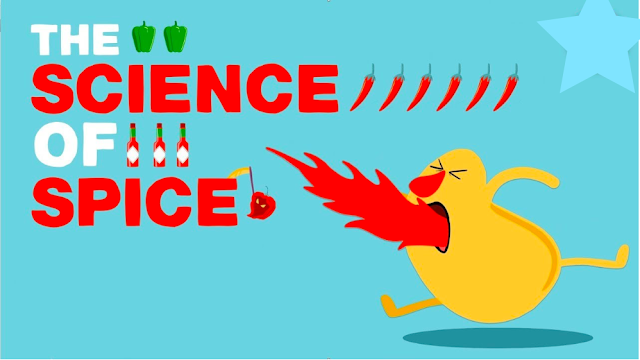Why does eating a spicy pepper cause your tongue to feel like it’s on fire?
How then do you stop the pain? Why does wasabi cause you to cry? Just how hot is the hottest spice?
Let’s step back a moment. Let’s define spiciness first. Although we frequently refer to something as tasting hot, it is not a taste like sweet, salty, or sour.
Rather, what actually occurs is that specific ingredients in spicy foods stimulate a class of sensory neurons known as polymodal nociceptors. They are the same receptors that are activated by extremely hot temperatures, and you have them all over your body, including your mouth and nose. Thus, eating a chilli pepper causes your mouth to feel as though it is burning because your brain truly perceives it as such. When you consume something that contains menthol, the reverse occurs. Cold receptors are being activated by the chilly, minty substance. Your body interprets the activation of these heat-sensitive receptors as being in contact with a harmful heat source and responds accordingly. Because of this, your heart begins to beat more quickly and you begin to perspire. The same fight-or-flight reaction that your body produces in response to the majority of threats was induced by the peppers.
But you’ve probably observed that not all spicy dishes are equally hot. The different sorts of chemicals involved also play a role. Alkyl amides are bigger, heavier molecules that make up the capsaicin and peperino, which are found in black pepper and chilli peppers and generally stay in your mouth. Smaller molecules called isothiocyanate, which are present in mustard, horseradish, and wasabi, are what allow them to easily float up into your sinuses. Because of this, wasabi and chilli peppers both cause mouth and nose burns.
The Scoville scale, which evaluates how much a food’s capsaicin content may be diluted before the heat is no longer discernible by humans, is the accepted yardstick for determining how spicy it is. A sweet bell pepper has 0 Scoville heat units, while the range for Tabasco sauce is 1,200–2,400. Two peppers typically prevail in the ongoing competition to produce the hottest pepper: the Trinidad Muruga Scorpion and the Carolina Reaper. These peppers have a Scoville heat rating of 1.5 to 2 million, which is roughly half that of pepper spray.
So why would someone want to consume something that is so painful?
Nobody is really sure when or why people began consuming hot peppers.
Researchers have discovered human artefacts from as far back as 23,000 years ago with spices like mustard. However, they are unsure if the spices were utilised for food, medicine, or only decoration. More recently, mustard was found in a 6,000-year-old crockpot that was lined with burnt fish and meat. According to one theory, people first began seasoning food to kill microorganisms. Additionally, other research indicate that the majority of spice development took place in warmer climes where microorganisms are also more common. But it’s still a little unclear why we still torture ourselves to hot cuisine nowadays.
Some people prefer the subsequent excitement of eating spicy food, even when the initial experience is unpleasant, similar to how they enjoy riding roller coasters. According to several research, those who prefer spicy foods are also more inclined to enjoy other high-adrenaline pursuits, such as gambling. Even genes may have a role in the desire for spicy cuisine. And if you’re considering exercising a little to increase your tolerance for spice, be aware of this. Some research claim that the pain doesn’t go away. Just get more resilient. In reality, studies show that those who enjoy spicy food do not perceive the burn as being any less severe than those who do not. They simply appear to prefer the discomfort. So go ahead and torture your heat receptors all you want, but keep in mind that spicy food will burn you.
Related Searches:
the science of spiciness linguahouse, capsaicin, what causes spicy taste in mouth, why is spicy food good for you, best science.
List of Tags:
Scoville scale, wasabi, horseradish, hot sauces, meals spicy, spiciness scale, spiciness meaning, spiciness level, spiciness synonym, spiciness measurement, spiciness of peppers, spiciness unit.

